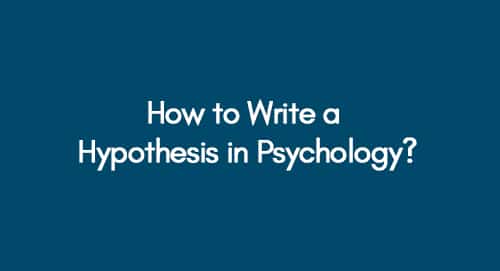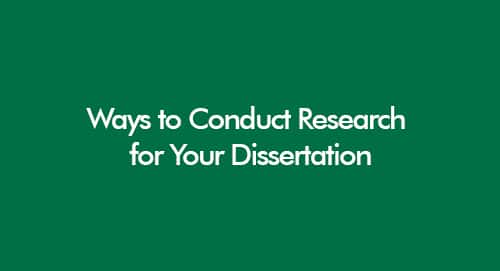
Plagiarism Remover Service That Can Help You Remove Plagiarism from Academic Papers Immediately
October 6, 2022
How to Write a Reference List? Practical Tips and Guidelines
October 10, 2022Crafting your objectives, hypotheses, and supporting arguments for your research represents a seamless extension of the initial stages of brainstorming, reading, writing, and concept development that initiated your research journey.
Take a Look at What is Hypothesis in the Dissertation Here
A hypothesis is a testable proposition crucial for empirical validation. Before starting experiments or data collection, it's vital to formulate hypotheses, especially for assessing connections between variables.
Learn More About Writing Hypothesis in Research
This article will discuss the multiple categories of hypotheses you may use, how to develop a strong hypothesis, how a hypothesis is utilized in psychology research, and, most importantly, how to write a hypothesis in psychology.
What is a Hypothesis in Psychology?
A hypothesis outlines your expectations for the conclusion of your research. It is a speculative, untested response to your research topic. You might need to develop several hypotheses for specific research projects that speak to various facets of your research issue.
Explore How to Write Research Project in an Expert Way
A hypothesis should be founded on accepted ideas and a body of information; it shouldn't just be a wild guess. Additionally, it must be testable so that you may use scientific research techniques to confirm or disprove it (such as observations, experiments, and statistical data analysis).
Find New Ways to Analyse Data with SPSS
In psychology, the hypothesis is a theory-based, experimentally tested claim about a fact, behaviour, relation, or something similar that predicts a particular outcome under specific conditions or presumptions.
Explore More on Research Topics Related to Criminal Psychology
In the scientific method, a hypothesis pertains to researchers' expectations regarding an experiment's outcome, whether in the realm of psychology or another discipline.
The following stages are part of the scientific method:
- Formulating a proposal
- Doing background investigation
- Form a supposition
- Making an experimental plan
- Gathering information
- Analyzing the outcomes
- Presenting the statistics
What are Variables?
Variables, or the components you are testing, are always discussed in the language of hypotheses. Anything seen can be a variable, including events, objects, ideas, etc.
Independent and dependent variables are the two different categories.
- Dependent variables are those you can only observe.
- Independent variables are those you can alter for your experiment.
Types of Hypothesis
The hypothesis you employ depends on what you're investigating and analyzing. Here are several typical Types of Hypotheses you might consider utilizing:
1. Simple Hypothesis
This kind of hypothesis suggests a link between one independent and dependent variable.
2. Complex Hypothesis
This kind of hypothesis alludes to a connection between three or more variables, such as two independent variables and one dependent variable.
3. Null Hypothesis
According to the null hypothesis, the two variables under investigation have no connection (one variable does not affect the other). It claims that the findings are accidental and do not affect the hypothesis under study.
4. Alternative Hypothesis
The alternative hypothesis proposes a relationship between the two variables under study, suggesting that one variable influences the other. It asserts the significance of results in substantiating the concept analysis, emphasizing that they are not mere outcomes of chance.
5. Statistical Hypothesis
Using statistical analysis, this hypothesis evaluates a representative population sample and propagates the results to the population.
6. Empirical Hypothesis
An empirical hypothesis is one that is under examination at the moment; it is often referred to as a "working hypothesis." Empirical hypotheses are dependent on actual data, contrasting logical hypotheses.
7. Logical Hypothesis
Without any research or supporting information, this hypothesis implies a link between the variables.
Developing a Hypothesis
- A hypothesis is a proposed explanation for a phenomenon.
- A hypothesis must be testable and falsifiable.
- A hypothesis must be based on observable evidence.
- A hypothesis should be simple and thrifty.
- A hypothesis should be able to be supported or refuted by data.
- A hypothesis should make predictions that can be tested by experimentation.
How to Write a Hypothesis in Psychology?
The question of how to write a hypothesis for research must start with a question you really want to answer through your research input.
Start by Asking a Question
A good hypothesis comes from a research question you want to answer. Your question should be short, clear, and fit what you can study.
Look closely at how things work. Find out where things come from that you see happening around you. If you can, pick a topic you find interesting for your research. This will make you naturally want to learn more about it.
Do Initial Research
Assemble some background data about the topic. The amount of background knowledge you require will depend on the task at hand. It can involve reading books, or it might only include running a short web search. Collect only the information you require to confirm or refute your hypothesis independently; you are not required to prove or invalidate it at the time.
Explain Your Variables
At this point, you can create a conceptual framework to specify the variables you'll examine and the interactions you believe exist between them. More complicated constructions may occasionally need to be operationalized.
Collect Evidence to Support Your Hypothesis
A hypothesis only serves as a framework to achieve a conclusion. You can start conducting experiments after defining your hypothesis and specifying your variables. It's ideal for gathering facts supporting your theory, but don't be concerned if your research disproves it; it's all a part of the scientific procedure.
Create Your Hypothesis
Now that you know what to anticipate, you can prepare yourself. Your initial response should be expressed in one clear, crisp sentence.
Revise and Refine
Ensure your hypothesis is evaluated and explicit. There are many ways to formulate a hypothesis, but it must include the following, and all terminology used must have precise definitions:
- The essential and relevant variables
- The particular group under observation
- The anticipated conclusion of the research or analysis
Methods of Collecting Data for Hypothesis
A researcher should choose a research plan and begin data collection after developing a scientific hypothesis. The research methodology mostly depends on the actual content under examination. Descriptive research and experimental research are the two fundamental sub-types of research methodology.
1. Descriptive Research
Descriptive research techniques, including case studies, naturalistic observations, and surveys, are frequently employed when it would be impractical or inconvenient to experiment. These techniques work well when describing several facets of behaviour or psychological phenomena.
2. Experimental Research
Experimental methods are employed to demonstrate the causal connections between the variables. In an experiment, a researcher deliberately modifies a critical variable (the independent variable) and evaluates the impact on a different variable (the dependent variable).
Conclusion
Finally, you should document your results in a research paper for others to access. It calls for some writing experience, a very distinct set of skills from experiments. The best way to learn how to write a hypothesis in Psychology is to read, research, and practice. Drop us a message for free samples of our written and published hypotheses in Psychology.
Get 3+ Free Dissertation Topics within 24 hours?
























